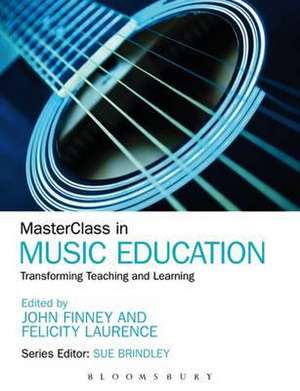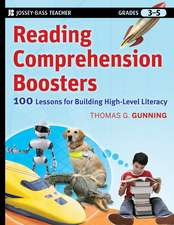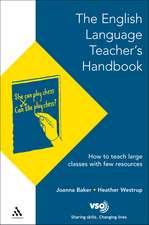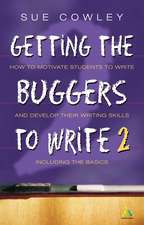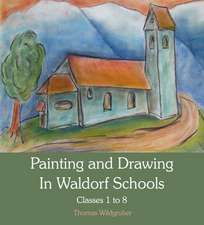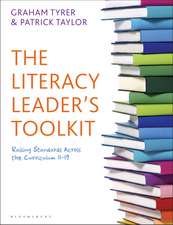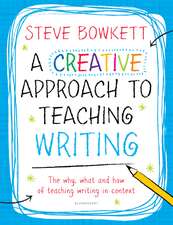MasterClass in Music Education: Transforming Teaching and Learning: MasterClass
Editat de John Finney, Dr Felicity Laurence Sue Brindleyen Limba Engleză Paperback – 30 ian 2013
| Toate formatele și edițiile | Preț | Express |
|---|---|---|
| Paperback (1) | 253.67 lei 6-8 săpt. | |
| Bloomsbury Publishing – 30 ian 2013 | 253.67 lei 6-8 săpt. | |
| Hardback (1) | 834.70 lei 6-8 săpt. | |
| Bloomsbury Publishing – 30 ian 2013 | 834.70 lei 6-8 săpt. |
Preț: 253.67 lei
Nou
Puncte Express: 381
Preț estimativ în valută:
48.54€ • 50.82$ • 40.26£
48.54€ • 50.82$ • 40.26£
Carte tipărită la comandă
Livrare economică 10-24 aprilie
Preluare comenzi: 021 569.72.76
Specificații
ISBN-13: 9781441130860
ISBN-10: 1441130861
Pagini: 256
Dimensiuni: 189 x 246 x 15 mm
Greutate: 0.5 kg
Ediția:New.
Editura: Bloomsbury Publishing
Colecția Bloomsbury Academic
Seria MasterClass
Locul publicării:London, United Kingdom
ISBN-10: 1441130861
Pagini: 256
Dimensiuni: 189 x 246 x 15 mm
Greutate: 0.5 kg
Ediția:New.
Editura: Bloomsbury Publishing
Colecția Bloomsbury Academic
Seria MasterClass
Locul publicării:London, United Kingdom
Caracteristici
Considers research methodology tailored specifically to music educational contexts and issues
Notă biografică
John Finney is Senior Lecturer in Music Education at the Faculty of Education, University of Cambridge, UK. Felicity Laurence is Lecturer in Music Education at Newcastle University, UK, where she is Director of the MA in Music and Education.
Cuprins
Series Foreword, Sue Brindley (University of Cambridge, UK)AcknowledgementsNotes on ContributorsPrefacePrologue: Rethinking Assessment in Music, Di Brady (Essex, UK)Part I: Setting the Scene: Reflective Music Teaching1. Music Teachers as Researchers, John Finney (University of Cambridge, UK)2. Doing Research in Music Education, Felicity Laurence (Newcastle University, UK)Part II: Investigating Music Educational PracticeIntroduction, Felicity Laurence (Newcastle University, UK)3. Young Children's Inventive Singing: A Critical Reading, Isla Hughes (Newcastle University, UK)4. Singing for Learning: Questions of Methodology and Method, Hannah Craine (London, UK)5. Children's Enjoyment of Singing in a Primary School: Processes and Problems in Survey Methodology, Rachael Baskaran (Hampshire, UK)6. Being Researched, Becoming a Researcher: Ethical Dilemmas, Julia Partington (Newcastle-upon-Tyme, UK)7. Transforming an 'Unmusical' Primary Teacher into a Confident Musician: A Case of Personal Narrative Enquiry, Zoe Bremner (Newcastle-upon-Tyme, UK)8. GCSE Music - Why so Few? Looking Again at Others' Research, Zoë-Laura Bridel (Jersey, UK)Part III: Teacher and Pupils Exploring TogetherIntroduction, John Finney (University of Cambridge, UK)9. Understanding Children's Musical Engagement in the Primary School Through Collaborative Research, Elizabeth Kelly (Oxfordshire, UK)10. Developing Positive Attitudes Towards Singing in Year 7 Through Dialogue and Negotiation, Eleanor Man (London, UK)11. Pupil Consultation as Catalyst for Cross-Curricular Learning in Secondary Schools, Oliver Bond (Hertfordshire, UK)Part IV: Understanding Young People's Musical Lives In and Out of SchoolIntroduction, John Finney (University of Cambridge, UK)12. The Problems of School Music: Self-Efficacy and Musical Identities in Years 7, 8 and 9, Hannah Bibby (Essex, UK)13. An After School Rock School Investigated: Why Are They Here? Joanne Cheetham (Hertfordshire, UK)14. Tom Becoming a Composer: A Narrative Account of One Pupil's Creative Journey, Laura Scott (Suffolk, UK)15. Playstation Power: Removing Performance Barriers to Musical Composition, Alex Baxter (Hertfordshire, UK)16. Performing Samba, Finding 'Flow': Fostering Engagement in the Secondary Music Classroom, Katy Ambrose (London, UK)Part V: ReflectionsIntroduction, Felicity Laurence (Newcastle University, UK)17. Making Sense of the Music of the Stranger, Kathryn Jourdan (Edinburgh, UK)Epilogue: Changing Music Education, Ruth Wright (University of Western Ontario, Canada)A Guided Reading ListIndex
Recenzii
The authors of this book cover critical issues in music education in ways that are thoughtful, reflective, and informed. As such issues are examined, this book can serve as a valuable resource for music education research projects, some of which will involve practitioners and pupils in context, and others on musical learning in formal and informal settings. This is not a prescriptive "how to" book but rather an insightful approach to methodological enquiry with a strong foundation constructed from the current literature.
This is an inspired book that challenges music education researchers and practitioners alike to consider 'what counts as research'. The many articulate voices from the classroom contained here show not just how to research in educational settings, but also why it is worthwhile.This book could make a real difference to teachers, pupils and researchers - and to a better mutual understanding between all involved in music education.
This is a fascinating collection of research projects rooted in the everyday realities of classroom music. What makes the book special is that the research is undertaken by relatively new teachers of music. Consequently there is a freshness and vitality about their narratives, which are imaginatively woven together by the two distinguished editors. Trainee music teachers will derive both motivation and inspiration in reading this book, so that hopefully they will strive to improve their own practice, and start to change things for the better.
This is an inspired book that challenges music education researchers and practitioners alike to consider 'what counts as research'. The many articulate voices from the classroom contained here show not just how to research in educational settings, but also why it is worthwhile.This book could make a real difference to teachers, pupils and researchers - and to a better mutual understanding between all involved in music education.
This is a fascinating collection of research projects rooted in the everyday realities of classroom music. What makes the book special is that the research is undertaken by relatively new teachers of music. Consequently there is a freshness and vitality about their narratives, which are imaginatively woven together by the two distinguished editors. Trainee music teachers will derive both motivation and inspiration in reading this book, so that hopefully they will strive to improve their own practice, and start to change things for the better.
